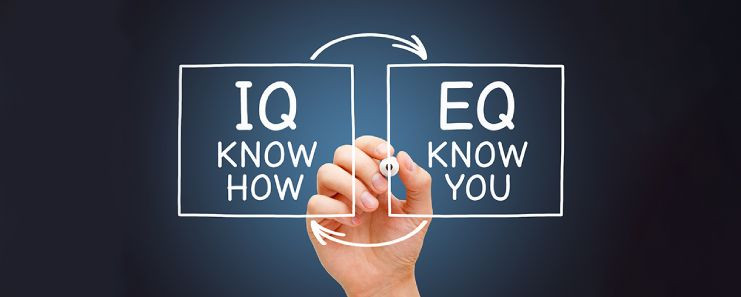We hear a lot about the importance of Emotional intelligence (EI) or Emotional Quotient (EQ) especially in these pandemic times when Covid-19 has ensured that the whole world is locked up inside their houses. The absence of physical interactions has made us realize the importance of people and the emotions they evoke in our lives more than ever.

While we are all aware of Intelligence Quotient (IQ), Emotional Intelligence and Emotional Quotient are less familiar terms. So, let’s explore what Emotional Intelligence is and how we can develop it to live a more effective and meaningful life.
What is Emotional Intelligence?
Emotional Intelligence is the ability to understand feelings - your own as well as others’, and how these emotions affect behavior. An emotionally intelligent person is aware of the influence emotions have on people, and acts accordingly, and consequently has more successful relationships all round. This ability is completely different from IQ.
Emotional Intelligence at the workplace
Emotional Intelligence is essential in the workplace. It is what explains why some people feel they are smarter than their bosses. While entry level positions require Intelligence Quotient, as you progress in the organization, it is your Emotional Intelligence in the workplace that differentiates you.

At this point of time, the whole world needs emotionally intelligent leadership. To take all of us ahead, towards a better, safer future. History has shown that the best leaders are those who touch the heart and emotions of people. Because at the end of the day, while we all admire logic and intelligence, we act on our emotions. Successful leaders have understood this and know how to address and motivate people.
An example of Emotional Intelligence in the Ramayana
The Ramayana gives us so many examples of Emotional Intelligence skills. There is a story of when Lord Rama was in exile, Shabari gave him some fruits. She had already tasted all the fruits so that the Lord didn’t have to eat sour fruits. Lord Rama understood the emotions behind it and ate the fruits she offered. This quality of Lord Rama manifests his Emotional Intelligence. It was part of what made him such a good leader. We all know of his famous defeat of the mighty King Ravana with the help of a band of monkeys. What we take for granted today because of years of storytelling was actually an incredible feat at that time.
The good news is that Emotional Intelligence skills such as empathy, social skills, motivation, and understanding are not just god-gifted traits but ones that can be acquired through various practices. Here are some tips on how.
How to increase Emotional Intelligence
1. Listen to others: Most of the time, we listen to others waiting to pounce on the breaks in conversation to insert our opinions in between. This tends to irk the person we are speaking with, making them less receptive, in turn, to our ideas and thoughts.

Instead, the next time you listen to someone, go all out and listen without having any agenda. A really good listener will, in fact, be able to bring out the most pertinent points of the speaker, making them feel satisfied with themselves. Also, he/she will also reciprocate. So, to enjoy the mirror effect, choose the behavior you would like to see in the reflection.
2. Exude positivity: Never underestimate the value of a good, positive attitude. You will find that even disgruntled and irked colleagues will become less hostile and more communicative when you make the atmosphere conducive with your positive vibes. This is just as true with personal relationships. You will face less friction if you stay positive and accessible.
3. Take responsibility: Emotionally intelligent people take responsibility for their actions. If they have made a mistake, they own up to it at work and at home. When you are honest and focused on the issue rather than your own mistakes, people connect with you. You will find that people around you are more forgiving and accepting of you.

4. Develop self-awareness: Spending time with yourself and going within will help you understand yourself better. When you gain perspective and learn to observe your thoughts and emotions like a bystander, you will become more objective about other people’s thoughts and feelings. After all, a person who identifies with his emotions can relate with others' needs too. To gain such a level of self-awareness, regular practice of meditation helps.
“You cannot always suppress your emotion nor can you always keep expressing it. Both will bring you difficulties and trouble. Emotions should be streamlined through wisdom. When there is wisdom, you know which emotion to express and which not to express. And where you should express, and where you should not.”
-Gurudev Sri Sri Ravi Shankar
5. Connect the breath & emotions: Emotions should be expressed at the right time and the right place and in the right way. An outburst of emotions is not helpful everywhere. An emotionally intelligent person knows to control emotions. One way is through the breath. If you observe yourself keenly, your breath is a representation of your emotion at that time. When you are angry, observe your breath. It is fast and heavy. You must have seen cartoons, which show clouds of hot air coming through their nose!

Simple pranayama techniques such as Nadi Shodhana pranayama can help you control your breath. And it will help you handle your emotions better. This is one of the important steps to becoming emotionally intelligent.
6. Empathize: In any given situation, try to think from another person’s perspective too. What you think is right, may not be the same for another person, especially while handling a big team. The number of opinions and perspectives are directly proportional to the number of people involved. Leaders must take time and think from the perspective of the others in the group. After all, they will grow only when their team grows. Being emotionally intelligent will help you understand this and act accordingly. Gurudev says, "The right perception happens when you put yourself in the other person’s shoes."

To increase your Emotional Quotient, you need to be in touch with yourself and your feelings. When your sense of self-awareness is keen, you can understand and connect with people.
It’s also important to understand that Emotional Intelligence is a quality that develops gradually throughout your life. Nurture plays a huge role in the development and cultivation of Emotional Quotient. What can facilitate healthy development of Emotional Quotient is meditation and knowledge. The more regular we are and the more we sustain our practice, the easier it will be to dive deeper within to find our inner strength, our sense of self esteem, a sense of creativity, and our inborn intuitive ability - and that translates into Emotional Intelligence.
The Online Meditation and Breath Workshop can help you connect with your inner self, enabling you to bond with and understand people in your workplace, home, and friend circle.
Written with inputs from Dr. Prema Seshadri, Faculty, The Art of Living


































